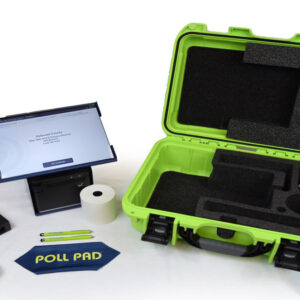(From a press release)
Delaware County Elections is beginning a phased rollout of new Electronic Pollbooks, also referred to as “e-pollbooks,” during the November 7, 2023 Municipal Election. Voters and poll workers at 168 of the County’s 428 precincts will be utilizing the new e-pollbooks in this election, with a full phase in of e-pollbooks by the 2024 Presidential Election. The cutting-edge e-pollbooks modernize the voter check-in process and have multiple advantages over traditional paper pollbooks, officials said.
Traditional paper pollbooks have long played a role in elections, but have several limitations compared to the new e-pollbooks.
Limitations of Paper Pollbooks
- Paper pollbooks are outdated as soon as they are printed and require workers to check “supplemental pages,” while the e-pollbooks contain the latest registration and mail-ballot data.
- Paper pollbooks have information only for voters in one precinct, while the e-pollbooks contain basic information on all 400,000-plus Delaware County voters. This means any voter in the wrong polling place can be quickly directed to the right location with a personalized printout with their correct polling site and address.
- Paper pollbooks, similar to phone books, are far slower to use.
- Each entry in the paper pollbooks must be scanned manually after Election Day, a process that can take weeks to generate the list of participating voters, often after the election is certified.
E-pollbooks generate the lists shortly after Election Day, long before the certification.
With the transition to e-pollbooks, Delaware County Elections aims to surmount these limitations and usher in a new era of efficiency and transparency in electoral administration. Here are some benefits of e-pollbooks.
One key advantage of the e-pollbooks is the ability to check-in voters more quickly. Instead of searching through hundreds of pages in a paper pollbook, workers with an e-pollbook simply enter the first three letters of a voter’s last name and first three letters of the first name to find the record. After the voter signs on the e-pollbook, a “ticket” is printed that the voter presents to the poll workers who record the voter’s name in the Numbered List of Voters and issue the ballot to the voter. The paper tickets later can be used, with the Numbered List, in post-election audits. This efficient method significantly reduces waiting times and human error, ensuring a smoother and faster voting experience.
In locations where multiple precincts share a voting space, the task of managing check-ins can be complex. E-pollbooks make this process more straightforward by allowing poll workers to manage the check-ins for two to six precincts simultaneously. This approach minimizes confusion, ensures voters are directed to the correct precinct the first time, and maintains the integrity of the electoral process. For this reason, Delaware County is deploying the first e-pollbooks at sites that host multiple precincts.
Sometimes, voters may find themselves at the right address but at the wrong table in a room serving two or more precincts. E-pollbooks help re-direct voters to their correct polling place or room, eliminating guesswork and reducing phone calls or online searches. This feature is especially useful in larger buildings, such as schools or community centers, where voters might arrive in the gym but need to go to the cafeteria.
In cases where a voter’s name is misspelled in the records or a voter has recently changed their name (e.g., registered as “Mary Jones” but changed the name to “Mary Smith-Jones”), e-pollbooks offer the flexibility to search by date of birth or address. This feature helps avoid voter disenfranchisement and allows individuals who have undergone name changes to exercise their right to vote without complications.
E-pollbooks provide poll workers with consistent instructions for every voter situation. Whether a voter needs to provide identification, submit a mail ballot and envelope, or cast a provisional ballot, e-pollbooks offer clear and standardized guidance. For example, e-pollbooks present poll workers with a full list of acceptable forms of ID. This consistency enhances the overall voting experience and ensures that all voters are treated fairly.
One of the most noteworthy advantages of e-pollbooks is the increased transparency they bring to the electoral process. They generate lists of voters who cast ballots on Election Day before the election is certified. This transparency builds trust and security to the election.
The addition of e-pollbooks is a critical step toward modernizing and improving the election process for poll workers and voters at the same time. This roll-out of e-pollbooks to 168 precincts follows a successful pilot project at the May 2023 Primary, when e-pollbooks were used at three locations that hosted 11 precincts in Brookhaven, Middletown, and Upper Darby. Poll workers at the pilot-project precincts reported strong satisfaction with the e-pollbooks.
As with the pilot project in May, the precincts in the roll out will have paper pollbooks to use only as emergency back-ups.


